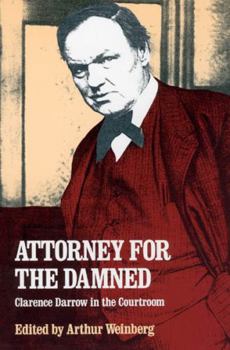Attorney for the Damned: Clarence Darrow in the Courtroom
Select Format
Select Condition 
Book Overview
"Clarence Darrow was] perhaps the most effective courtroom opponent of cant, bigotry, and special privilege that our country has produced. All of Darrow's most celebrated pleas are here--in defense of Leopold and Loeb (1924), of Lieutenant Massie (1932), of Big Bill Haywood (1907), of Thomas Scopes (1925), and of himself for attempted bribery."--The New Yorker
Format:Paperback
Language:English
ISBN:0226136493
ISBN13:9780226136493
Release Date:February 1989
Publisher:University of Chicago Press
Length:552 Pages
Weight:1.43 lbs.
Dimensions:1.2" x 5.5" x 8.5"
Customer Reviews
5 ratings
Valuable
Published by Thriftbooks.com User , 14 years ago
Has transcripts of many of his closing arguments. He was a great philosopher, not only a lawyer. A worthy read. I lend it to others, and never get it back, so I have to constantly buy new copies of the book.
A Lawyer for All Seasons
Published by Thriftbooks.com User , 15 years ago
Anyone considering a career as a trial lawyer should read this book. So should anyone interested in American history: Darrow the lawyer was smack in the middle of every major issue, cause, and debate in the first third of the twentieth century. The sign on his office door read "We Defend Everyone," and he lived up to that promise. Darrow defended Leopold and Loeb, argued against capital punishment, argued for the right to teach evolution in schools, represented union members, communist party members, and defendants of all stripes in all sorts of murder cases -- including several high profile capital cases in which the accused were members of minority groups. In short, he defended all those who were "damned" by the government and the public in the early twentieth century. As the closing arguments in this book demonstrate, Darrow was a great and powerful orator, a persuasive debater, the common man as brilliant philosopher, a speaker who could wax eloquent with the best of them -- and ultimately a hard-working, dedicated trial lawyer who won his cases by speaking plainly and simply to petit jurors, person to person. Many of his summations left the jurors, and everyone else in the courtroom, in tears. If you don't want your son or daughter to go to law school, don't let him or her read this book.
A Friend of the Oppressed
Published by Thriftbooks.com User , 19 years ago
The 'Forward' by Justice William O. Douglas says this book contains addresses delivered to juries in criminal cases, and speeches on controversial subjects. Darrow opposed bigotry, prejudice, ignorance, and hate. He was always fighting for equal protection, due process, and a fair trial. Darrow trusted juries more than judges to protect the life and liberty of the citizen. He was also a champion of labor when unions were often regarded as illegal, and suffered from government by injunction. The 'Introduction' by Arthur Weinberg says Darrow was an orator who played on the emotions of his listeners. But people acted mainly through emotions. Darrow's pleas always had a powerful rational basis. He also defended many causes that were unpopular at the time. Clarence Darrow was a corporate lawyer until he became an attorney for the American Railway Union and its president Eugene Victor Debs. Was it a matter of conscience (p.xxx)? This book contains an edited selection of Darrow's speeches, giving the background and the aftermath. "Crime and Criminals" has his speech to the prisoners in the Cook County jail. Darrow contrasts the acts of the convicts to the actions of the monopolists (gas, trolley, oil). Advertisements in the newspapers are all lies. More people go to jail in hard times than in good times. Most people who go to jail are poor; they can't afford a good lawyer. There is a correlation between increased poverty and increased crime. Darrow suggests crime is a natural phenomenon, like cattle seeking a better pasture. Having a good lawyer is more important than guilt or innocence! Laws exist to protect the ruling class, not to do justice. Darrow suggests that living where there is plenty of land and a chance to make a living would result in no crime (p.14). Although Darrow was involved in many famous trials, he may be best remembered for the Scopes Evolution Case. Thomas Scopes discussed evolution in his high-school class to challenge a new Tennessee law. The publicity made Dayton famous. The famous William Jennings Bryan, a fundamentalist, advocated these laws and volunteered to help the prosecution. [If this is all you know of Bryan, please learn more.] Darrow examined Bryan on a question of law, the jury was not present. The next day this testimony was stricken from the record. The jury found Scopes guilty. On appeal the Tennessee Supreme Court reversed this, and dismissed the case. The Tennessee constitution banned state support of a religion. Most teachers today are still controlled by state laws as to what they can teach. In the aftermath of the trial of the McNamara brothers for bombing the Los Angeles Times Building in 1911, Darrow was accused of attempting to bribe a juror. Darrow's investigators were double agents who offered a bribe, and claimed Darrow did it. Such agent provocateurs are found in movements like labor unions. Darrow said the State had put spies and informers into his defense team. and the LA police admitted so (p.5
If this guy isnt your hero he should be.
Published by Thriftbooks.com User , 22 years ago
Book is stunning. Makes you realize that language used to be more valued. The guy was amazing simply amazing.
Excellent
Published by Thriftbooks.com User , 25 years ago
It is nice to know that in one point in our society that there was somebody whocared about the little guy, the poor,the downridden, the underdog etc.,Clarence Darrow found a cause and stuckto it like a fly on poop. It takes guts to stand up against the establishmentand never apologize for it.We need more guys like him.





